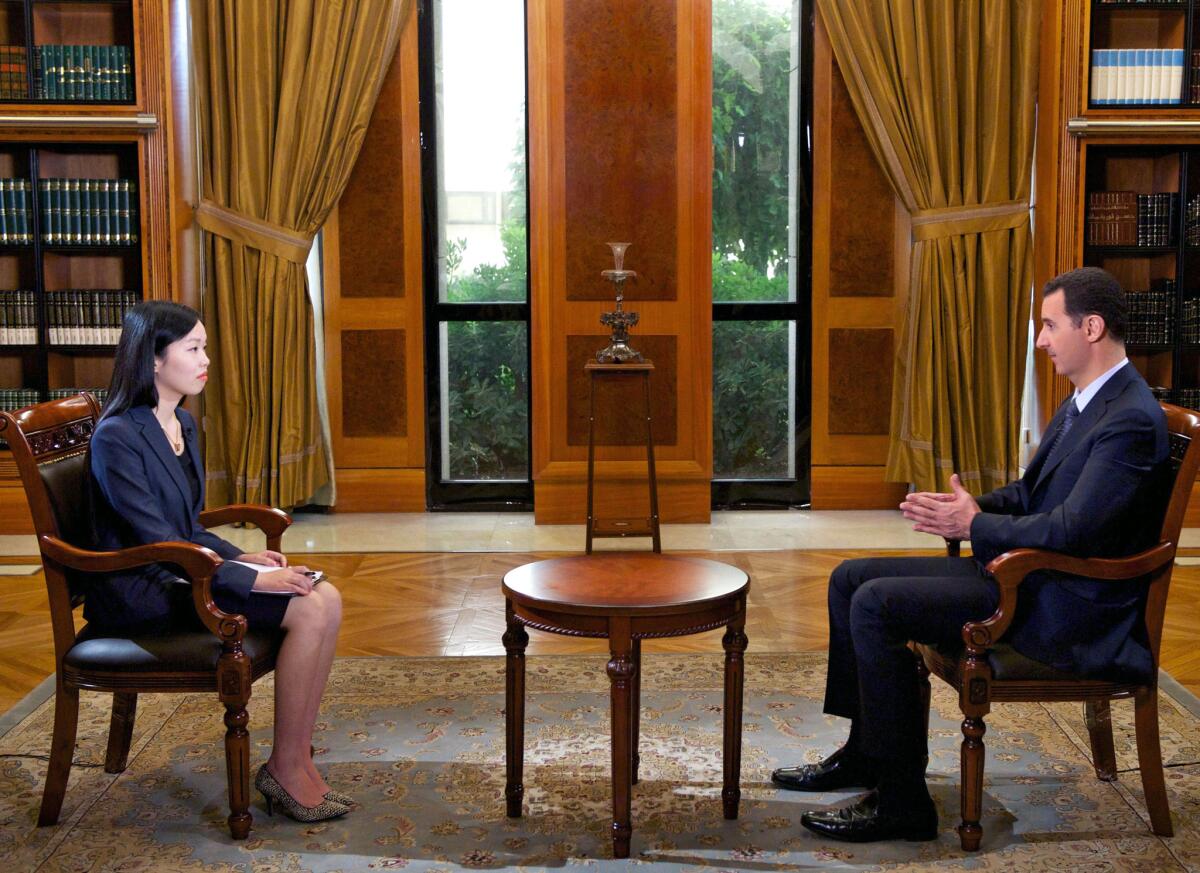Syria discloses locations of dozens of chemical weapons sites

- Share via
UNITED NATIONS -- Signaling that he may be serious about cooperating with the United States and averting military strikes against his government, Syrian President Bashar Assad has disclosed the locations of “dozens” of chemical weapons production and storage sites to international inspectors, Western officials said Tuesday.
Officials familiar with Assad’s disclosure -- the first step in complying with an ambitious U.S.-Russian plan to seize or destroy his chemical weapons by mid-2014 -- described it as “a serious document” that comprises scores of pages and is “surprising” in its thoroughness.
In the document, submitted last week to the Organization for the Prohibition of Chemical Weapons, the number of listed facilities tracks roughly with the U.S. intelligence assessment that Syria has at least 45 sites associated with its weapons program, the officials said. Nearly half of those are believed to contain toxic materials that could still be used.
Obama administration officials have said that Syria’s disclosure would be the first test of its willingness to abide by a Sept. 14 agreement in Geneva between the United States and Russia, Assad’s most powerful ally, that shelved the threat of U.S. airstrikes if he gave up the weapons program. Officials said that for now it appeared that Assad had met the test.
“It’s not necessarily 100% accurate, and we aren’t naïve -- we don’t know what we don’t know,” said one Western official, who spoke on condition of anonymity because the document hasn’t been released publicly. “We are still looking at it, but it seems interesting.”
The disclosure may buy Assad some breathing room as the United States, Britain and France haggle with Russia over a United Nations Security Council resolution to enforce the agreement. Russia has rebuffed U.S. efforts to invoke Chapter 7 of the U.N. Charter, which allows military force in case of noncompliance.
The two sides remained “pretty far apart” on the language of the resolution, according to one diplomat. Secretary of State John F. Kerry and his Russian counterpart, Sergei Lavrov, were due to discuss the issue Tuesday on the sidelines of the U.N. General Assembly meeting in New York.
Addressing the annual gathering of world leaders, President Obama called Syria’s accounting of its chemical stockpiles “a first step” but pressed for the U.N. to hold Assad accountable for a poison gas attack outside Damascus last month that the U.S. says killed more than 1,400 people.
“There must be a strong Security Council resolution to verify that the Assad regime is keeping its commitments, and there must be consequences if they fail to do so,” Obama said. “If we cannot agree even on this, then it will show that the U.N. is incapable of enforcing the most basic of international laws.”
State Department officials have declined to discuss details of Syria’s disclosure, saying they would wait until after the Organization for the Prohibition of Chemical Weapons distributes it to member states, which is expected later this week.
In an interview with Chinese state television on Monday, Assad said his accounting was “credible” and pledged to comply with international inspectors.
Assad’s government maintains that the August attack on pro-rebel suburbs of Damascus was a “provocation” by the opposition to persuade the international community to intervene in the country’s 2½-year-old war.
ALSO:
Kenya mall attack: Three soldiers killed, officials say
Eviction of Palestinian community sparks diplomatic spat
Obama says U.N. must show it ‘means what it says’ on chemical weapons
Twitter: @SBengali
More to Read
Sign up for Essential California
The most important California stories and recommendations in your inbox every morning.
You may occasionally receive promotional content from the Los Angeles Times.










